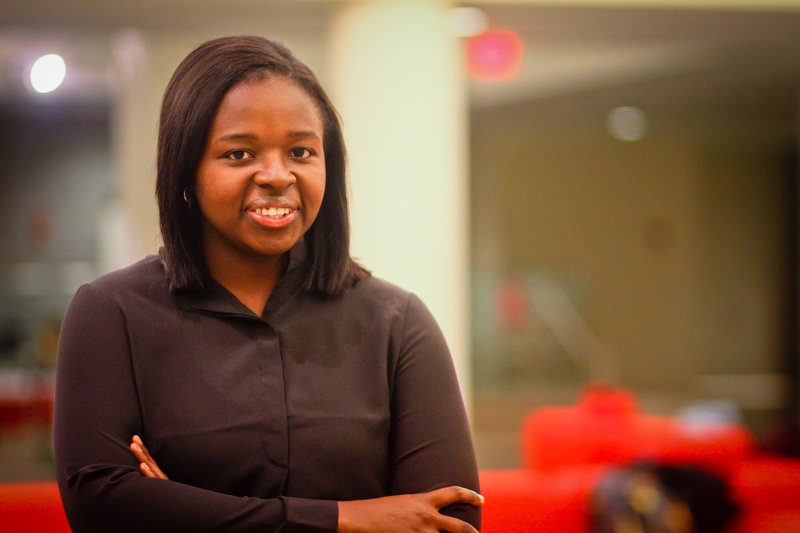
Ariel Worthy
The Birmingham Times
For the first time in its 130-year history, the Harvard Law Review has a black woman as president.
ImeIme (pronounced “Ah-MAY-may”) Umana, 24, the third-oldest of four daughters of Nigerian immigrants, was elected on Jan. 29 by the review’s 92 student editors as the president of its 131st volume.
The Harvard Law Review, like other law reviews, allows students to improve their legal writing skills and gives scholars an opportunity to thrash out legal arguments. It is the most-cited journal of its kind, and has the largest circulation of any such publication in the world.
Its presidency is considered the highest-ranking student position at the highly competitive law school and a ticket to virtually anywhere in the legal realm. Half of the current Supreme Court justices served on the Harvard Law Review, though none as its president.
“It still feels like magic that I’m here,” Umana said in an interview, though her fellow students said it was not magic at all but her sharp legal mind, intense work ethic, leadership ability and generosity of spirit that catapulted her to the top.
Umana’s emergence now has raised questions about why it took so long for a black woman to reach the pinnacle of the review and how her perspective may influence a publication that has for most of its existence been led by white men.
“I’m constantly reminded of people like Natasha McKenna and Tanisha Anderson and Sandra Bland, whose relationships with the law were just simply tragic,” she said.
Unlike the vast majority of graduates of the nation’s top law schools, Umana says she has no interest in joining a high-paying corporate firm. Instead, she dreams to become a public defender, a goal she set after an eye-opening internship last summer in the public defender’s office in the Bronx. She plans to work this summer with the public defender in Washington.
“A lot of the clients I worked with that summer and since have looked a lot like me,” she said. “They are disproportionately represented on the unfortunate end of the legal system, so it struck a little closer to home.”
Born in State College, Pa., Umana graduated from Susquehanna Township High School in Harrisburg, where her father, who died in 2010, was a statistician for the state. She is a 2014 graduate of Harvard College, where she majored in government and African-American studies.
She was elected president of the law review in an intense 12-hour period of deliberations that stretched over two days — typical for this annual process — and included a rigorous evaluation of each candidate’s portfolio of work and responses to a written questionnaire, questions at a candidate forum and a writing exercise.
Umana was one of 12 candidates for president, including eight minority students and eight women.
“I think our team saw in her what so many people have seen in her for so long — that she’s a brilliant person, an unbelievably dedicated worker and an exceptionally caring leader,” said Michael L. Zuckerman, a third-year law student and the review’s previous president.
So why did it take so long to elect a black woman?
In Umana’s opinion, the delay reflects a wide gap between black women and law school — and the law in general, a profession in which minorities have historically been underrepresented.
“We’ve been systematically excluded from the legal landscape, the legal conversation, and we’re just now making some important inroads,” she said.
Umana said her goals as president of the review were to recruit a diverse set of editors, publish a diverse group of authors and basically get out of the editors’ way.
She has lined up a clerkship for after graduation next year with Judge Robert L. Wilkins of the United States Court of Appeals for the District of Columbia Circuit. After that, she said, she is flexible on her route to becoming a public defender.
It was Umana’s “clarity of purpose” that struck Ruth Okediji, a 1991 graduate of Harvard Law School and now a professor at the University of Minnesota Law School, from their first meeting. When Umana reached out to Okediji, who was a visiting professor at Harvard last year and has become an important mentor to her, Umana took with her another young woman who was also going to the law school.
“ImeIme was not just looking out for herself,” Okediji said. “I say to all my mentees: ‘You are not successful until you have brought the next woman up. It’s not success if it’s just you.’ ImeIme has looked behind her. That’s evidence of leadership and integrity of spirit.”
Umana is in great company in breaking barriers at the Harvard Law Review. It has been 27 years since the first black man, an older student by the name of Barack Obama, was elected president of the prestigious journal. It has been even longer — 41 years — since the first woman, Susan Estrich, was elected to the position. Since then, subsequent presidents have been female, Hispanic, Asian-American, openly gay and black.
Her tenure begins in the fall.
The New York Times contributed to this article.




